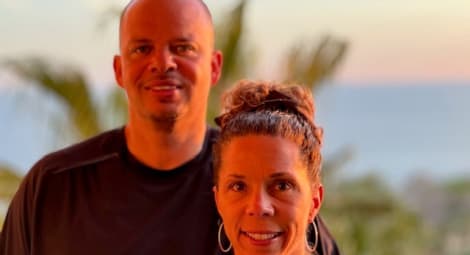Stroke patient’s quick response leads to successful recovery

By Holly Byrne
June Tennyson was at her home on Day Island one evening in January when she noticed something strange.
“I was attempting to touch my face while looking into a mirror and saw that my right hand kept slipping past the area I was trying to touch,” June recalls. “It took a few seconds for me to realize something wasn’t normal. I got up and carefully walked into the kitchen, took out a piece of paper, and started to write my name.” While her writing seemed normal, her speech was not. The 85-year-old called her neighbor, Donna, for help. “’Something’s wrong,’ I told her, ’but I don’t know what it is.’”
Donna came over right away and they both noticed her speech was fine one minute, slurred and garbled the next. After consulting with Donna’s husband, a retired ENT, they decided the best thing to do was go to the ER. Fast.
Within 45 minutes of the first symptoms, June was at MultiCare Allenmore Hospital’s emergency department, where she learned she had a stroke.
What is a stroke?
A stroke is a life-threatening medical emergency that occurs when a vessel in the brain is blocked by a blood clot (ischemic stroke) or ruptures (hemorrhagic stroke), preventing enough oxygen-rich blood from reaching part of the brain. June had suffered an ischemic stroke, which makes up about 85 percent of all strokes in the United States.
The symptoms displayed by June were mostly visible in her speech and coordination, two common signs of stroke. “When I was checking in at the emergency department I was able to say my first name and date of birth, but couldn’t say my last name,” June says. “I could spell it but I couldn’t say it. It was really weird.”
June was given Alteplase, a medication that dissolves the clot and improves blood flow when administered soon after a stroke occurs. It worked. She was later admitted to MultiCare Tacoma General Hospital, a state-designated Level One Stroke Center that provides the highest level of care for patients with stroke.
Rehabilitation after stroke
After four days at Tacoma General June was transferred to MultiCare Good Samaritan Rehabilitation Center. During her six days in rehab she graduated quickly from wheelchair to walker. She received occupational, physical and speech therapy, all aimed to help her rehabilitate from the stroke and be able to manage at home on her own. “They kept me very busy with five therapy sessions a day. When I began physical therapy there were things I didn’t feel I’d be comfortable doing at home. I have had two hip replacements and I was nervous about falling. But by the last day I could do it all and felt much more stable and agile.”
June praises the care she received throughout, particularly at Good Samaritan Rehabilitation Center. “The nursing staff were simply amazing. They were persistently kind and truly care about the people who are there. They really go the extra mile!”
Don’t delay care
The one thing June would do differently is call 911. “Calling my neighbor seemed like the right thing to do in the moment. But if it happens again I would call 911.” Calling 911 is important in cases of stroke, as treatment begins in the ambulance. People who delay seeking medical care for more than one hour after experiencing stroke symptoms have a much higher likelihood of permanent damage to brain tissue, disability and death.
“If you think you may be having a stroke or heart attack, it is imperative that you seek emergency care immediately,” says Michelle Hunter-Behrend, MD, Medical Director at MultiCare Allenmore Hospital emergency department. “Symptoms such as weakness, numbness, difficulty speaking, chest pain, shortness of breath or confusion cannot be ignored, as there are time-sensitive interventions that can only be administered and effective if a patient presents promptly to the emergency department. Even during these uncertain times, please do not delay care if you are having a true emergency.”
Now that June is home, she continues to do the exercises she learned in rehab and goes for regular walks around her neighborhood. She uses a walking stick when needed, and notices her balance and stability are better than they were before.
“I can do everything I could do before the stroke, like gardening, housework, cooking, and playing bridge with my friends,” June says. “I actually feel better than I did before. I feel really blessed.”
Stroke care at MultiCare
Learn more about MultiCare’s award-winning stroke centers in both the South Sound and Inland Northwest regions.



